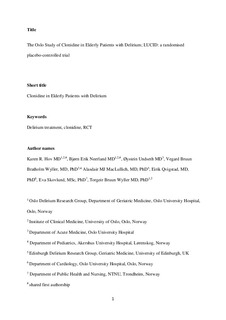| dc.contributor.author | Hov, Karen Roksund | |
| dc.contributor.author | Neerland, Bjørn Erik | |
| dc.contributor.author | Undseth, Øystein | |
| dc.contributor.author | Wyller, Vegard Bruun Bratholm | |
| dc.contributor.author | MacLullich, Alasdair M.J. | |
| dc.contributor.author | Qvigstad, Eirik | |
| dc.contributor.author | Skovlund, Eva | |
| dc.contributor.author | Wyller, Torgeir Bruun | |
| dc.date.accessioned | 2019-09-19T11:10:30Z | |
| dc.date.available | 2019-09-19T11:10:30Z | |
| dc.date.created | 2019-06-27T15:11:02Z | |
| dc.date.issued | 2019 | |
| dc.identifier.citation | International Journal of Geriatric Psychiatry. 2019, 34 (7), 974-981. | nb_NO |
| dc.identifier.issn | 0885-6230 | |
| dc.identifier.uri | http://hdl.handle.net/11250/2617650 | |
| dc.description.abstract | Objectives
The aim of this double‐blinded randomised placebo‐controlled trial was to investigate the efficacy of clonidine for delirium in medical inpatients greater than 65 years.
Methods
Acutely admitted medical patients greater than 65 years with delirium or subsyndromal delirium were eligible for inclusion. Included patients were given a loading dose of either placebo or clonidine; 75 μg every third hour up to a maximum of four doses to reach steady state and further 75 μg twice daily until delirium free for 2 days, discharge or a maximum of 7 days of treatment. The primary endpoint was the trajectory of the Memorial Delirium Assessment Scale (MDAS) for the 7 days of treatment. Presence of delirium according to the Diagnostic and Statistical Manual of Mental Disorders (DSM‐5) criteria and severity measured by MDAS were assessed daily until discharge or a maximum of 7 days after end of treatment.
Results
Because of slower enrolment than anticipated, the study was halted early. Ten patients in each group were studied. The low recruitment rate was mainly due to the presence of multiple patient exclusion criteria for patient safety. There was no significant difference between the treatment group in the primary endpoint comparing the trajectory of MDAS for the 7 days of treatment using mixed linear models with log transformation, (P = .60). The treatment group did not have increased adverse effects.
Conclusions
No effect of clonidine for delirium was found, although the study was under powered. Further studies in less frail populations are now required. | nb_NO |
| dc.language.iso | eng | nb_NO |
| dc.publisher | Wiley | nb_NO |
| dc.title | The Oslo Study of Clonidine in Elderly Patients with Delirium; LUCID: a randomised placebo-controlled trial | nb_NO |
| dc.type | Journal article | nb_NO |
| dc.type | Peer reviewed | nb_NO |
| dc.description.version | acceptedVersion | nb_NO |
| dc.source.pagenumber | 974-981 | nb_NO |
| dc.source.volume | 34 | nb_NO |
| dc.source.journal | International Journal of Geriatric Psychiatry | nb_NO |
| dc.source.issue | 7 | nb_NO |
| dc.identifier.doi | 10.1002/gps.5098 | |
| dc.identifier.cristin | 1708394 | |
| dc.description.localcode | Locked until 22.3.2020 due to copyright restrictions. This is the peer reviewed version of an article, which has been published in final form at [https://doi.org/10.1002/gps.5098]. This article may be used for non-commercial purposes in accordance with Wiley Terms and Conditions for Self-Archiving. | nb_NO |
| cristin.unitcode | 194,65,20,0 | |
| cristin.unitname | Institutt for samfunnsmedisin og sykepleie | |
| cristin.ispublished | true | |
| cristin.fulltext | original | |
| cristin.qualitycode | 1 | |
